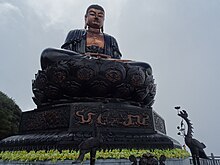
Buddhism in Vietnam (Vietnamese: Đạo Phật, 道佛 or Phật Giáo, 佛教), as practiced by the Vietnamese people, is a form of East Asian Mahayana Buddhism. It is the main religion in Vietnam. Vietnamese Buddhism is generally inclusive and syncretic, drawing on the main Chinese Buddhist traditions, such as Tiantai (Vietnamese: Thiên Thai) and Huayan (Hoa Nghiêm), Zen (Thiền), and Pure Land (Tịnh Độ).[1][2][3]
Buddhism may have first come to Vietnam as early as the 3rd or 2nd century BCE from the Indian subcontinent or from China in the 1st or 2nd century CE.[4] Vietnamese Buddhism has had a syncretic relationship with certain elements of Taoism, Chinese spirituality, and Vietnamese folk religion.[5] Theravada Buddhism also exists, as well as indigenous forms of Vietnamese Buddhism such as Bửu Sơn Kỳ Hương and Hòa Hảo.
- ^ Cuong Tu Nguyen & A.W. Barber. "Vietnamese Buddhism in North America: Tradition and Acculturation". in Charles S. Prebish and Kenneth K. Tanaka (eds). The Faces of Buddhism in America. Berkeley: University of California Press, 1998, pg 130.
- ^ "Buddhist Studies: Mahayana Buddhism: Vietnam". www.buddhanet.net. Retrieved 2023-05-14.
- ^ Cite error: The named reference
Prebish, Charles 1998. p. 134was invoked but never defined (see the help page). - ^ Cuong Tu Nguyen. Zen in Medieval Vietnam: A Study of the Thiền Uyển Tập Anh. Honolulu: University of Hawaii Press, 1997, pg 9.
- ^ Cuong Tu Nguyen & A.W. Barber 1998, pg 132.